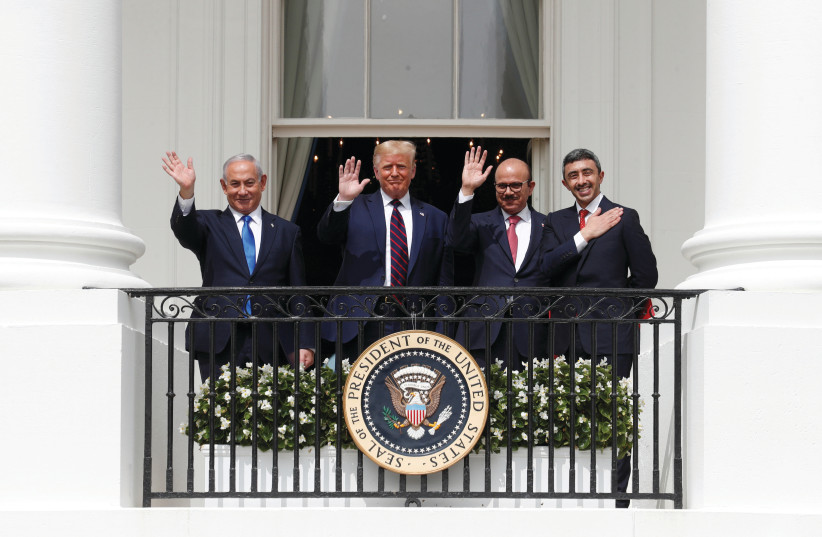Does the American abandonment of Afghanistan teach us anything about the future of our relations with the US?
There is no apparent analogy between the Israeli case and the Afghan case. There, the military relied heavily on American forces, and at the moment of truth it faded away. We have the IDF, the Mossad, the Shin Bet, and these have recorded glorious achievements over the years that have astonished the entire world. Israel is a strategic asset for the US: an effective “aircraft carrier,” an island of stability in a troubled part of the world, a start-up nation whose contributions to the US are significant and diverse. American mothers know that we do not expect their sons and daughters to shed their blood on our behalf. If this is the case, why should the American decision to abandon Afghanistan bother us?
The answer lies in the fact that the US has made a decision based entirely on a cold calculation of interests. When in the background are the harsh scenes from Kabul airport, US spokesmen have not been tired of explaining that the very abandonment is a justified strategic move because it comports with the US national interest. The term “interest” appeared five times in US President Joe Biden’s speech arguing that the conflict in Afghanistan “is not in the national interest.” He even expressed the elusive and mutable nature of interests, explaining that there is no sense in wasting resources in Afghanistan, as other interests await the US elsewhere.
The calculus of interests is well used by Israel’s most strident critics in the US. Following the recent round of fighting between Israel and Hamas, Harvard Prof. Stephen Walt penned an article entitled: “It’s Time to End the ‘Special Relationship’ With Israel.” The bottom line: “The benefits of US support no longer outweigh the costs.” The writer’s hostility toward Israel does not surprise those who follow his writings, but his words this time reflect an unsettling mindset that should not be ignored.
Fortunately, Israel’s special relationship with the US does not rest solely upon a cold account of interests. These relations are based on common essential values: freedom, democracy and human rights. They are fortified by the presence of a thriving Jewish community in the US, which has a great impact on the way Israel is perceived in the eyes of the Americans. The proportion of Jews in the American population is only 2%, but the power of their influence is much greater. They are prominent in all areas of life: government, academia, business, media, art, culture and law. Thanks in no small measure to them, Israel finds itself in the camp of the “good guys.”
The lessons of Afghanistan’s interest-driven abandonment necessitate examining whether we can preserve the essential underpinnings of the US-Israel relationship that do not depend on the shifting sands of evolving interests. Such an examination soon reveals the deepening cracks in two keystones of the special relationship:
• Common values and bipartisan support
The deep sense of shared destiny and common values between Israel and the US has traditionally been evident in the bipartisan support for Israel. But in recent years, Israel has tied its fate solely to the Republican Party and this has resulted in intensified criticism. It has been argued, especially among Democrats, that Israel has abandoned its liberal values and become oblivious to human rights considerations.
• Solidarity with American Jewry
For many years, American Jewish support has been the cornerstone of Israel’s high esteem in the US. But today, many Jews no longer feel proud to be identified with Israel. The Netanyahu era instilled a feeling in the hearts of many Jewish Democrats (70% of all US Jews) that the Israeli government has turned its back on them because they have criticized its conduct.

NO MAGNIFYING glass is required to trace the thread connecting between the various ills that threaten the special relationship with the US, it is Israel’s continued occupation and control of another people. It is this reality that contradicts the shared values, fractures the ability to maintain bipartisan support, and damages the solidarity between Israel and American Jewry.
Despite all that, Israel does not seem to be bothered that it is an occupying nation. Only a third of American Jews believe that the Israeli government is making a sincere effort to reach a peace agreement with the Palestinians. Of the Jews who support the ruling Democratic Party, only 20% think so. It is not for nothing that an anti-Israel atmosphere is emerging in Congress, as there is a growing impulse to draw parallels between the fate of Palestinians and the fate of African Americans.
The ideological polarization, unrelated to Israel, that has deepened in the US further complicates the challenge facing the Israeli government: to maintain bipartisan sympathy, uphold the credence of common values, and foster Jewish solidarity. Netanyahu placed his bet on the Republican camp and accelerated the process of Israel becoming a party-dependent issue in the US. The Lapid-Bennett government seeks to redraw this picture. On his first day as foreign minister, Lapid emphasized the importance of bipartisan support for Israel and also declared his commitment to reset the discourse with Diaspora Jewry.
Indeed, our bonds with the American people is Israel’s most valuable strategic asset – it is conditioned on the support of American Jewry and the nurturing of common values that are immune to transient calculations of interest. The new government’s change of rhetoric is important, but ahead of Prime Minister Naftali Bennett’s visit to Washington, it is crucial that we don’t indulge in delusions: Without a solution to the Israeli-Palestinian conflict, the ongoing occupation will continue to poison our relations with American Jewry and threaten our special relations with the US.
The writer is a senior fellow at The Jewish People Policy Institute, a former director-general of the Foreign Ministry and author of Shimon Peres: An Insider’s Account of the Man and the Struggle for a New Middle East.
